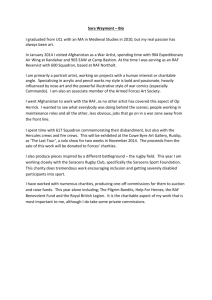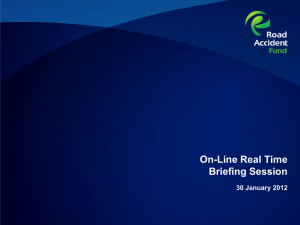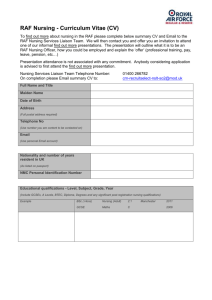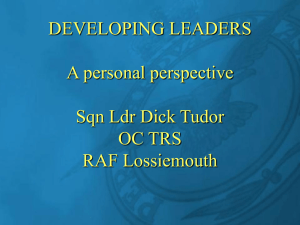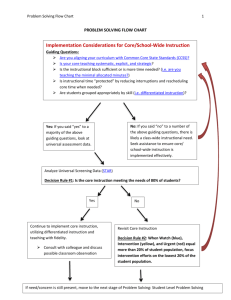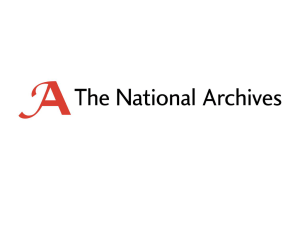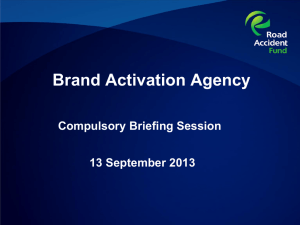The Road Accident Fund`s Integrated Annual Report 2012 was
advertisement
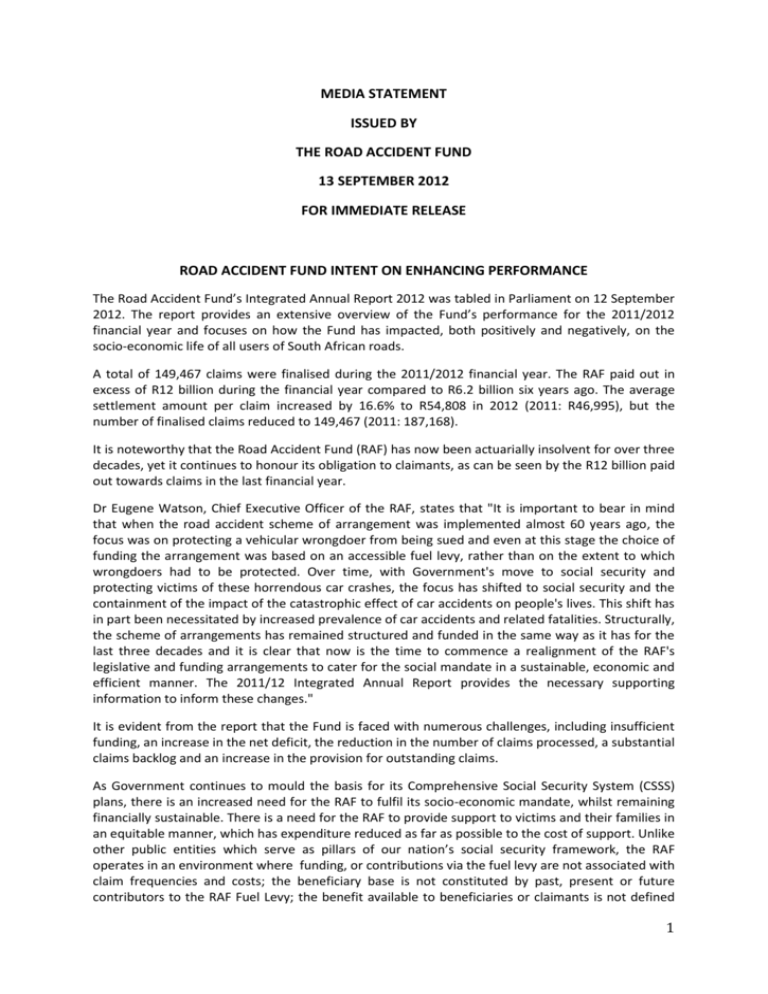
MEDIA STATEMENT ISSUED BY THE ROAD ACCIDENT FUND 13 SEPTEMBER 2012 FOR IMMEDIATE RELEASE ROAD ACCIDENT FUND INTENT ON ENHANCING PERFORMANCE The Road Accident Fund’s Integrated Annual Report 2012 was tabled in Parliament on 12 September 2012. The report provides an extensive overview of the Fund’s performance for the 2011/2012 financial year and focuses on how the Fund has impacted, both positively and negatively, on the socio-economic life of all users of South African roads. A total of 149,467 claims were finalised during the 2011/2012 financial year. The RAF paid out in excess of R12 billion during the financial year compared to R6.2 billion six years ago. The average settlement amount per claim increased by 16.6% to R54,808 in 2012 (2011: R46,995), but the number of finalised claims reduced to 149,467 (2011: 187,168). It is noteworthy that the Road Accident Fund (RAF) has now been actuarially insolvent for over three decades, yet it continues to honour its obligation to claimants, as can be seen by the R12 billion paid out towards claims in the last financial year. Dr Eugene Watson, Chief Executive Officer of the RAF, states that "It is important to bear in mind that when the road accident scheme of arrangement was implemented almost 60 years ago, the focus was on protecting a vehicular wrongdoer from being sued and even at this stage the choice of funding the arrangement was based on an accessible fuel levy, rather than on the extent to which wrongdoers had to be protected. Over time, with Government's move to social security and protecting victims of these horrendous car crashes, the focus has shifted to social security and the containment of the impact of the catastrophic effect of car accidents on people's lives. This shift has in part been necessitated by increased prevalence of car accidents and related fatalities. Structurally, the scheme of arrangements has remained structured and funded in the same way as it has for the last three decades and it is clear that now is the time to commence a realignment of the RAF's legislative and funding arrangements to cater for the social mandate in a sustainable, economic and efficient manner. The 2011/12 Integrated Annual Report provides the necessary supporting information to inform these changes." It is evident from the report that the Fund is faced with numerous challenges, including insufficient funding, an increase in the net deficit, the reduction in the number of claims processed, a substantial claims backlog and an increase in the provision for outstanding claims. As Government continues to mould the basis for its Comprehensive Social Security System (CSSS) plans, there is an increased need for the RAF to fulfil its socio-economic mandate, whilst remaining financially sustainable. There is a need for the RAF to provide support to victims and their families in an equitable manner, which has expenditure reduced as far as possible to the cost of support. Unlike other public entities which serve as pillars of our nation’s social security framework, the RAF operates in an environment where funding, or contributions via the fuel levy are not associated with claim frequencies and costs; the beneficiary base is not constituted by past, present or future contributors to the RAF Fuel Levy; the benefit available to beneficiaries or claimants is not defined 1 and in some instances is not limited to a maximum value; and social security is not limited to protecting income, support or funding healthcare needs, but extends to all three of the key elements of social security. “Attention is being placed on the identification of sustainable funding mechanisms which are related to the benefits provided by the Fund, clarifying what benefit is available to claimants, and determining who may claim for compensation. This is necessary to ensure that the RAF and the commitment of Government to support and compensate victims of road accidents remain sustainable. There will need to be a careful balancing of equitable access and the benefits provided," says Watson. Presently, the annual revenue from fuel levies now exceeds R16.9 billion, as a result of an 8 cents per litre increase in the RAF Fuel Levy and an increase in the volume of fuel sold over the previous calendar year. A net deficit of over R46 billion has been reported and it is necessary that this be contextualised. The deficit represents the difference between the Fund’s assets and liabilities, with the largest proportion of the liabilities being a provision for future claims which may still be received for accidents which have occurred prior to the present day. The liability is not a reflection of claim payments already made, but an actuarial estimation or provision which indicates what the Fund is likely to spend in the future on accidents which have occurred. The Fund is therefore basically providing a guarantee to road accident victims for the next five years. In practical terms, the liability of R54 billion represents a social pledge that the Fund is still required to honour to road accident victims. The report further highlights the fact that the processing of claims is prolonged by an expansive litigation process where attorneys, advocates, assessors, experts and the courts are involved in the pursuit of proving fault and the extent of that fault, as well as the quantum of loss and injury. This became evident more recently where it was found that more than 90 percent of claims being processed are represented by attorneys. Claims processing is also dependant on the operational efficiency of the Fund and measures have been put in place to optimise internal claims processing. The need to perform medical assessments once optimal medical improvement has taken place (usually a year or eighteen months after the accident) also extends the time periods required to quantify the damages. Lastly, processing is prolonged further by the fact that claims can be submitted within five (5) years from the date of an accident and claims by minors can be lodged three (3) years after the age of majority (18 years) has been reached, leading to difficulty in sourcing relevant documentation to substantiate the claims. Further reasons for the reduced claim settlement activity are the outstanding Mvumvu matter and unintended consequences of the Amendment Act, as outlined below. The Constitutional Court found it unconstitutional to treat pre-Amendment Act passenger claims (which had not been settled at the date of the judgement) as limited claims (i.e. R25,000), which resulted in the RAF not being able to settle these claims during the year under review. A draft Amendment Bill is currently being considered in Parliament and approximately 15,000 claims will be affected once this Bill is passed. The number of personal claims lodged with the RAF reduced substantially after the 2008 Amendment Act was introduced. Prior to the introduction of this Act, the RAF received in excess of 100,000 personal claims annually, of which the majority represented claims for minor injuries (such as ‘whiplash’ and other soft tissue injuries). Currently, the RAF receives less than 50,000 personal claims per annum, but these claims are mostly for more serious injuries, which require expert medical opinions and the determination of future loss of earnings. As a result, claims of 2 this nature have become more complex and time-consuming to settle. The estimated effect is that approximately 24,000 claims to the value of R2.2 billion require settlement. In addition, a trend has developed where pre-Amendment Act claims for minor injuries have now become claims involving future loss of earnings related to minor to moderate head injuries. A great deal of work has been performed by the Fund to reduce the volume of historic claims, to the extent where the backlog of open claims is almost half of what it was in 2005 and 2006 - down from a high of 400,000 claims. A number of initiatives have been put in place to encourage road accident victims to claim directly from the RAF as this is a more cost-effective and less time-consuming modality. The Fund currently holds cash reserves of R4.2 billion as a consequence of the nature and volume of claims received and processed. Management interventions have been implemented to expedite the payment of claims and this cash reserve is likely to reduce in the short term. The Fund has not sought any form of a ‘bail out’, but does continue to engage the National Treasury on sustainable funding mechanisms, as the disjuncture between the fuel levy and the benefits paid is well established. Regrettably, fraud continues to represent a significant risk to the RAF’s assets, service delivery, efficiency and reputation. A zero tolerance approach to fraudulent and corrupt activities has been adopted, and the RAF has, in its Fraud Policy, declared its intention to vigorously pursue any party, by all legal means available, that engages in such activities or attempts to do so. During the year under review, 6,782 cases were lodged and finalised and there were 502 arrests and 244 convictions. According to Watson, the 2012 financial year saw a number of achievements, among other, an unqualified audit opinion from the Auditor-General, capacitation of the RAF Procurement environment, and the Investment Policy has been maintained. Furthermore, there has been a conscious improvement in customer-centricity, with more than 29,000 claims originated, over 440 mass funerals attended to and in excess of 13,000 patients receiving continuous care at home. Other initiatives, such as the ‘RAF on the Road’ campaign, aimed at enhancing the Fund’s accessibility and visibility, were introduced. RAF employees took to the road to bring the organisation’s core service offering directly to communities across the country. Community members are assisted with RAF claims procedures, claims settlements are made on the spot, medical undertakings certificates are issued, status updates are provided, and potential claimants are encouraged to lodge their claims directly with the RAF. With regard to legislative enablement, the 2012 financial year saw the finalisation of the longawaited Road Accident Benefit Scheme (“RABS) Policy, which was published on 21 November 2011. The so-called “no-fault policy” provides that victims of road accidents will no longer be required to prove fault or contributory fault on the part of another driver. This will mean that access to emergency healthcare, support and rehabilitation will be immediate and not dependent on an investigation as to how the accident occurred and who was to blame. The focus will rest firmly on the needs of the victim, thus speeding up the claims settlement process. Says Dr Ntuthuko Bhengu, Chairperson of the RAF Board: “The DoT’s policy proposal to move to a no-fault benefit scheme is welcomed, as this will best meet the needs of the South African public by providing a reasonable, equitable, affordable and sustainable scheme that focuses on medical requirements and rehabilitation. In the short and medium term, Government will need to consider interim legislative changes to ensure that inefficiencies in the current compensation system are minimised and contained.” 3 “Looking to the future,” says Bhengu, “the RAF is committed to establishing a customer-centric, operationally efficient and effective organisation, centred on the principles of improving accident information collection and management; proactively originating benefit applications; improving service delivery efficiency and effectiveness; expanding its geographic footprint and improving reach/accessibility; improving risk management and fraud prevention; and improving accountability and performance management.” Issued by: The Office of the Chief Executive Officer Dr Eugene Watson Road Accident Fund For further detail, contact Connie Nel, Senior Manager: Communications, Road Accident Fund, on: E-mail: connien@raf.co.za Tel: (012) 621-1609 Mobile: 083-280-7247 Ends 4
